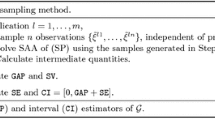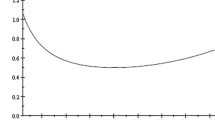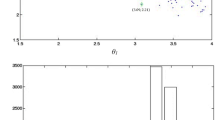Abstract.
This paper studies the use of randomized Quasi-Monte Carlo methods (RQMC) in sample approximations of stochastic programs. In numerical integration, RQMC methods often substantially reduce the variance of sample approximations compared to Monte Carlo (MC). It seems thus natural to use RQMC methods in sample approximations of stochastic programs. It is shown, that RQMC methods produce epi-convergent approximations of the original problem. RQMC and MC methods are compared numerically in five different portfolio management models. In the tests, RQMC methods outperform MC sampling substantially reducing the sample variance and bias of optimal values in all the considered problems.
Similar content being viewed by others
References
Artstein, Z., Wets, R.J.-B.: Stability results for stochastic programs and sensors, allowing for discontinuous objective functions. SIAM J. Optim. 4 (3), 537–550 (1994)
Artstein, Z., Wets R.J.-B.: Consistency of minimizers and the SLLN for stochastic programs. J. Convex Anal. 2 (1–2), 1–17 (1995)
Attouch, H.: Variational convergence for functions and operators. Pitman (Advanced Publishing Program), Boston, MA, 1984
Billingsley, P.: Convergence of probability measures. John Wiley & Sons Inc., New York, 2nd edn, 1999
Boyle, P., Broadie, M., Glasserman, P.: Monte Carlo methods for security pricing. J. Econ. Dyn. Cont 21, 1267–1321 (1997)
Bratley, P., Fox, B.L., Schrage, L.E.: A guide to simulation. Springer-Verlag, 2 edn, 1987
Caflisch, R., Morokoff, W., Owen, A.: Valuation of mortgage backed securities using brownian bridges to reduce effective dimension. J. Comput. Finance 1, 27–46 (1997)
Cranley, R., Patterson, T.N.L.: Randomization of number theoretic methods for multiple integration. SIAM J. Numer. Anal. 13 (6), 904–914 (1976)
Faure, H.: Discrépance de suites associées à un système de numération (en dimension s). Acta Arith. 41 (4), 337–351 (1982)
Fox, B.L.: Algorithm 647: Implementation and relative efficiency of quasirandom sequence generators. ACM Transactions on Mathematical Software 12 (4), 362–376 (1986)
Friedel, I., Keller, A.: Fast generation of randomized low discrepancy point sets. In: K.-T. Fang, F.J. Hickernell, H. Niederreiter (eds) Monte Carlo and Quasi-Monte Carlo Methods 2000, Springer Verlag, 2002, pp. 257–273
Halton, J.H.: On the efficiency of certain quasi-random sequences of points in evaluating multi- dimensional integrals. Numer. Math. 2, 84–90 (1960)
Hammersley, J.M.: Monte Carlo methods for solving multivariable problems. Ann. New York Acad. Sci. 86, 844–874 (1960)
Higle, J.L.: Variance reduction and objective function evaluation in stochastic linear programs. J. Comput. 10, 236–247 (1998)
Infanger, G.: Monte Carlo (importance) sampling within a Benders decomposition algorithm for stochastic linear programs. Ann. Oper. Res. 39, 69–95 (1992)
Jäckel, P.: Monte Carlo Methods in Finance. John Wiley & Sons, 2002
Kouwenberg, R.: Scenario generation and stochastic programming models for asset liability management. European J. Oper. Res. 134 (2), 279–292 (2001)
L’Ecuyer, P., Lemieux, C.: Variance reduction via lattice rules. Management Sci. 46 (2), 1214–1235 (2000)
L’Ecuyer, P., Lemieux, C.: Recent advances in randomized quasi-Monte Carlo methods. In: M. Dror, P. L’Ecuyer, F. Szidarovszki (eds). Modeling Uncertainty: An Examination of Stochastic Theory, Methods, and Applications, Kluwer Academic Publishers, 2002, pp. 419–474
Linderoth, J., Shapiro, A., Wright, S.: The empirical behavior of sampling methods for stochastic programming. Optimization technical report 02-01, Computer Sciences Department, University of Wisconsin-Madison, 2002
Lucchetti, R., Salinetti, G., Wets, R.J.-B.: Uniform convergence of probability measures: topological criteria. J. Multivariate Anal. 51 (2), 252–264 (1994)
Lucchetti, R., Wets, R.J.-B.: Convergence of minima of integral functionals, with applications to optimal control and stochastic optimization. Statist. Decisions 11 (1), 69–84 (1993)
Matsumoto, M., Nishimura, T.: Mersenne twister: A 623-dimensionally equidistributed uniform pseudorandom number generator. ACM Trans. Modeling Comput. Simulation 8 (1), 3–30 (1998)
Niederreiter, H.: Low-discrepancy and low-dispersion sequences. J. Number Th. 30, 51–70 (1988)
Niederreiter, H.: Random number generation and quasi-Monte Carlo methods, volume 63 of CBMS-NSF Regional Conference Series in Applied Mathematics. Society for Industrial and Applied Mathematics (SIAM), Philadelphia, PA, 1992
Pennanen, T., Koivu, M.: Epi-convergent discretizations of stochastic programs via integration quadratures. Stochastic Programming E-print Series, 2003
Press, W.H., Teukolsky, S.A., Vetterling, W.T., Flannery, B.P.: Numerical recipes in C. The art of scientific computing. Cambridge University Press, Cambridge, 2nd edn, 1992
Rockafellar, R.T., Wets, R.J.-B.: Variational analysis, volume 317 of Grundlehren der Mathematischen Wissenschaften [Fundamental Principles of Mathematical Sciences]. Springer-Verlag, Berlin, 1998
Shapiro, A.: Stochastic programming by Monte Carlo simulation methods. Stochastic Programming E-Print Series, 2000
Shapiro, A.: Inference of statistical bounds for multistage stochastic programming problems. Math. Meth. Oper. Res. 58, 57–68 (2003)
Sloan, I.H., Joe, S.: Lattice methods for multiple integration. Oxford Science Publications. The Clarendon Press Oxford University Press, New York, 1994
Sobol’, I.M.: The distribution of points in a cube and the approximate evaluation of integrals. U.S.S.R. Computational Math. And Math. Phys. (4), 86–112 (1967)
Tuffin, B.: On the use of low discrepancy sequences in Monte Carlo methods. Monte Carlo Methods and Appl. 2 (4), 295–320 (1996)
Wang, X., Fang, K.T.: The effective dimension and quasi-Monte Carlo integration. J. Complexity 19, 101–124 (2002)
Zervos, M.: On the epiconvergence of stochastic optimization problems. Math. Oper. Res. 24 (2), 495–508 (1999)
Author information
Authors and Affiliations
Corresponding author
Rights and permissions
About this article
Cite this article
Koivu, M. Variance reduction in sample approximations of stochastic programs. Math. Program. 103, 463–485 (2005). https://doi.org/10.1007/s10107-004-0557-0
Received:
Accepted:
Published:
Issue Date:
DOI: https://doi.org/10.1007/s10107-004-0557-0




